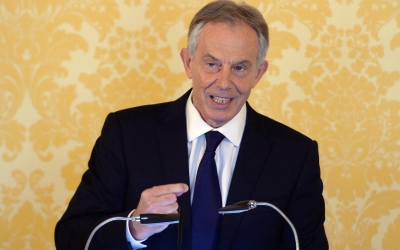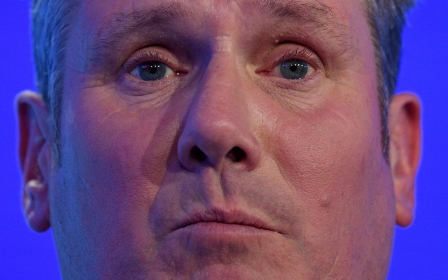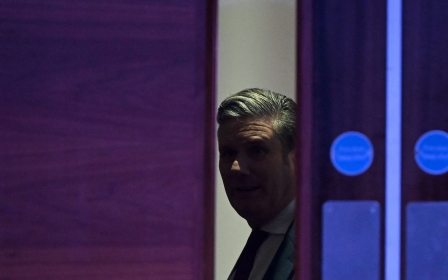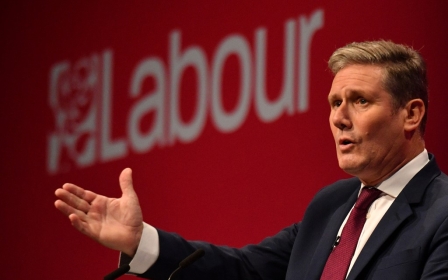Blair crowns a visionless Keir Starmer as Britain crumbles
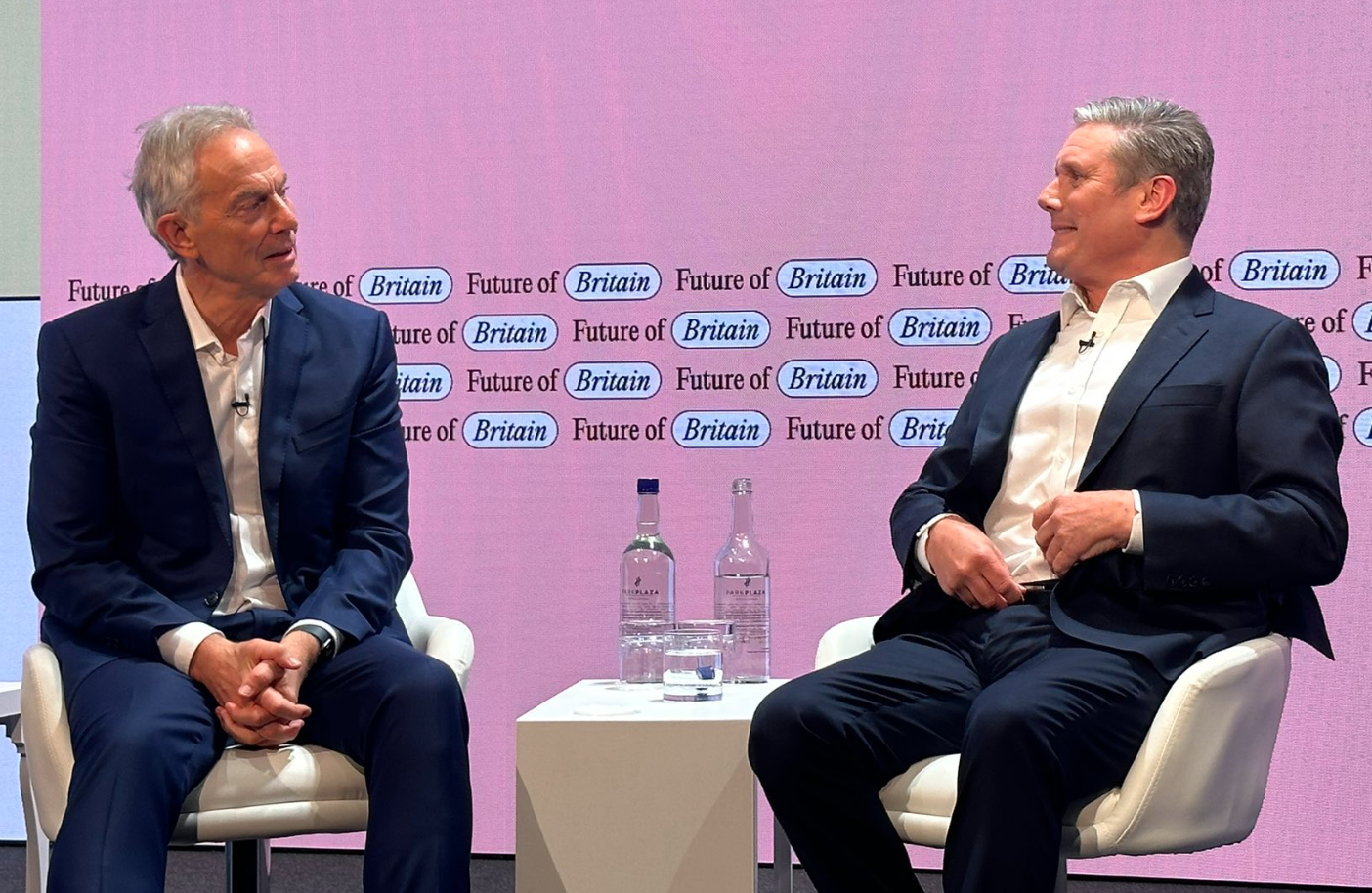
After three years as the leader of Britain's Labour Party, Keir Starmer looked perfectly at ease sitting beside Tony Blair, the prime minister who took his country into the US-led invasion of Iraq, resulting in a war that killed hundreds of thousands of Iraqis.
Starmer was a guest at Blair’s Future of Britain conference in central London on Tuesday, an event hosted by the Tony Blair Institute for Global Change, a think tank funded in part by Saudi Arabia and the US State Department.
In July 2018, the Telegraph reported that the former Labour prime minister had signed a deal worth £9m with Saudi Arabia, months before the murder and dismemberment of journalist Jamal Khashoggi at the kingdom's embassy in Istanbul. Blair never returned the money.
The Financial Times’ chief political correspondent, who was in attendance this week, commented on Twitter: “Maybe my imagination but I thought Tony Blair looked just a bit misty eyed as he effectively passed the baton to Keir Starmer at his Future of Britain conference. A clear anointing of Starmer as a worthy successor.”
While the British High Court ruled in 2017 that Blair should not face prosecution for his role in the invasion of Iraq, anger over the war has persisted. At the Future of Britain event, the former prime minister was not alone in that respect. Starmer's talk followed Henry Kissinger, the centenarian former US diplomat, whose presence might have given Blair some comfort that in the hall of infamy, he is not the big daddy.
New MEE newsletter: Jerusalem Dispatch
Sign up to get the latest insights and analysis on Israel-Palestine, alongside Turkey Unpacked and other MEE newsletters
Kissinger has been accused of more crimes of empire than perhaps any other American political figure, as chief diplomat and security advisor to Richard Nixon and then Gerald Ford.
These include the secret bombing of Cambodia and Laos, backing the 1973 Pinochet coup in Chile, support for the genocidal Pakistani invasion of newly independent Bangladesh in 1971, and for the brutal annexation of East Timor by Indonesia’s Suharto dictatorship. He also gave the “green light” to Argentina’s generals to carry out the “dirty war” against leftists in 1976.
Blair, who became extremely rich after he left office, offering advice to global corporations, central Asian dictators and Middle East tyrants, trotted out the familiar claim that Labour under Starmer’s predecessor Jeremy Corbyn had been “on the brink of extinction” in 2019 following the party’s defeat. (It was Corbyn who apologised as leader for Labour’s role in the invasion of Iraq, a war he opposed back in 2003.)
Lies and more lies
Starmer is comfortably ahead in the polls against an unpopular, discredited Tory government that was set to face a triple drubbing in byelections on Thursday, leaving Rishi Sunak's premiership in tatters.
But the Labour leader told Blair that people he spoke to were sceptical as to whether he could bring any change to the UK, with a large group questioning whether any promise would be delivered. “We’ve been lied to so much in the last 13 years we don’t actually believe anything anybody says,” said Starmer.
The fact that millions of voters do not believe politicians is on Blair and Starmer as much as it is on former prime minister Boris Johnson
The irony of this observation is hard to miss. Starmer pledged to maintain progressive policies inherited from Corbyn, and to restore party unity, then ditched both pledges, with a relentless move toward the centre-right and a purge of left-wing members.
Next to him sat Blair, whose government “sexed up” a dossier on non-existent Iraqi weapons of mass destruction in order to convince the British public and politicians to back a disastrous invasion.
The fact that millions of voters do not believe politicians is on these two politicians as much as it is on former prime minister Boris Johnson for his three years of lying to the country over Brexit, Covid parties and who was buying his wallpaper.
The gathering took place in a week when Starmer went all-out to prove his Thatcherite credentials by ditching a Labour promise to remove the cap on benefits for families with more than two children. The policy, brought in by George Osborne, the former Conservative chancellor, is emblematic of a decade of austerity that has seen child poverty in Britain rise to more than four million, or one in three children.
The cost of poverty
Poverty campaigners and think tanks have argued that the cap, which has kept 250,000 children in poverty, is cruel and unnecessary and could be reversed at the cost of £1.3bn, a tiny sum compared to the billions the government has wasted during the Covid-19 pandemic on dodgy insider contracts (Parliament was told last year that £4bn worth of unusable PPE equipment would be burnt).
But cost is not the issue here: this is political signalling of the most cynical kind, to the Tory media and their readers, that Starmer’s Labour will not help the poor, or tax the rich. This week, Blair also called for spending on public services to be cut and for more privatisation in the health service, something even Rishi Sunak's Conservatives would not openly argue for.
It is an extraordinary fact of British political life, little remarked upon, that starting wars, cosying up to dictators, taking large donations from private corporate interests - as both Blair and Starmer have done - are all considered respectable activities for leaders or ex-leaders of a nominally left-wing party. Both men are knights of the realm, despite widespread opposition in the UK to Blair receiving the knighthood in 2022.
It was also opposed by Iraqis. As Kamal Jabir, an Iraqi politician with the Civil Democratic Alliance, told Middle East Eye last year: "The 2003 war against Iraq was a crime against humanity - therefore Blair should be tried instead of getting rewarded.”
Starmer has been telling anyone who will listen that he will model his government - should he win in 2024, as polls currently suggest - on Blair’s, except that the British economy is in a mess, and the neoliberal model of outsourced services, threadbare welfare, and mass poverty left by the Tories will remain largely unchanged.
Blair’s first term saw a flurry of constitutional reforms, including devolution in Scotland and Wales, peace in Northern Ireland, and a minimum wage.
Starmer's reforming agenda amounts to vague plans for decentralisation of decision-making to local communities, and the replacement of the House of Lords with an elected second chamber.
Britain is already the most centralised of all western democracies, and is crying out for devolution. But Starmer’s actions as leader suggest by contrast that he prefers to tightly control decisions from the centre, and has no interest in democratic reforms.
Following a speech in March in which Starmer praised former Tory leader Margaret Thatcher for her focus on law and order, SNP firebrand Mhairi Black said: "People in Scotland will be appalled that Keir Starmer is taking his lead from Margaret Thatcher, who left lasting scars on our communities.” She added that under Starmer, Labour "has lurched to the right, and is now little more than a pound-shop Tory tribute act – copying Tory policies and quoting Tory prime ministers.”
And the scars are everywhere. Near where I live the evidence of poverty and crime is hard to miss: homelessness, drug abuse and the constant sound of police sirens speak of a country slowly falling apart. But the future of Britain under Starmer looks like an outdated 90s tribute act to Blairism and Thatcherism.
The views expressed in this article belong to the author and do not necessarily reflect the editorial policy of Middle East Eye.
Middle East Eye delivers independent and unrivalled coverage and analysis of the Middle East, North Africa and beyond. To learn more about republishing this content and the associated fees, please fill out this form. More about MEE can be found here.



